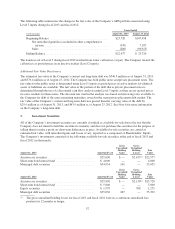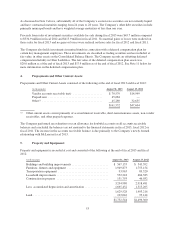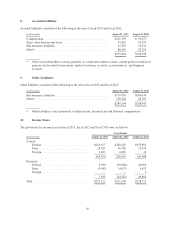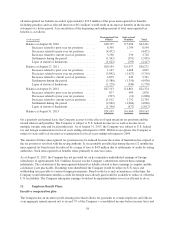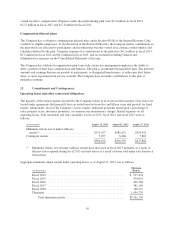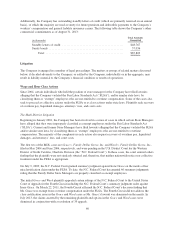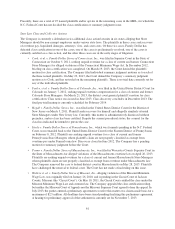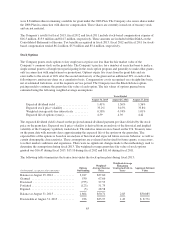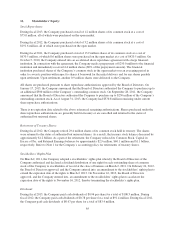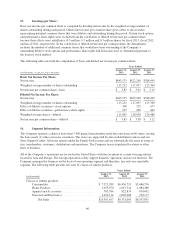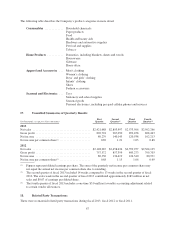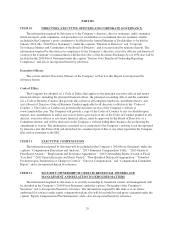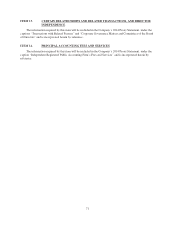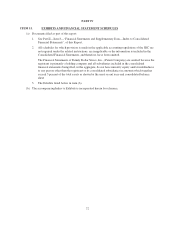Family Dollar 2013 Annual Report Download - page 66
Download and view the complete annual report
Please find page 66 of the 2013 Family Dollar annual report below. You can navigate through the pages in the report by either clicking on the pages listed below, or by using the keyword search tool below to find specific information within the annual report.
Given the multiple dismissals obtained by the Company of the cases pending in the MDL and the preliminary
stage of the other state court wage and hour cases, no reserve is appropriate for any of these cases, except for
Walters, which is the subject of a preliminary settlement agreement.
Gender Pay Litigation
Luanna Scott, et al. v. Family Dollar Stores, Inc.
On October 14, 2008, a complaint was filed in the U.S. District Court in Birmingham, Alabama captioned
Scott, et al. v. Family Dollar Stores, Inc. alleging discriminatory pay practices with respect to the Company’s
female Store Managers. This case was pled as a putative class action or collective action under applicable statutes
on behalf of all Family Dollar female Store Managers. The plaintiffs seek recovery of compensatory and punitive
money damages, recovery of attorneys’ fees and equitable relief. The case was transferred to the Federal District
Court, Western District of North Carolina.
Presently, there are 48 named plaintiffs in the Scott case. On January 13, 2012, the trial court granted the
Company’s Motion to Strike the class allegations asserted in the Complaint based in part upon the United State
Supreme Court’s ruling in Dukes v. Wal-Mart. The plaintiffs’ filed an appeal of the Court’s dismissal of the class
allegations to the United States Court of Appeals for the Fourth Circuit. On October 16, 2013, the Fourth Circuit
Court of Appeals partially reversed the trial court’s ruling. While the Fourth Circuit agreed that the original
Complaint should not proceed as a class action, it remanded the case and instructed the trial court to allow the
amendment of the complaint, and then consider whether the case based upon the amended complaint should
proceed as a class action. The Company is considering its options regarding additional review of the Fourth
Circuit’s ruling.
The Company has tendered the matter to its Employment Practices Liability Insurance (“EPLI”) carrier for
coverage under its EPLI policy. At this time, the Company expects that the EPLI carrier will participate in any
resolution of the case. The Company has exceeded its insurance retention and any additional legal fees and
settlements should be covered by the EPLI carrier. No reserve is appropriate due to the preliminary status of the
case.
Other Matters
The Company is involved in numerous other legal proceedings and claims incidental to its business, including
litigation related to alleged failures to comply with various state and federal employment laws, some of which
are, or may be pled as class or collective actions, and litigation related to alleged personal or property damage, as
to which the Company carries insurance coverage and/or has established accrued liabilities as set forth in the
Company’s financial statements. While the ultimate outcome cannot be determined, the Company currently
believes that these proceedings and claims, both individually and in the aggregate, should not have a material
effect on the Company’s financial position, liquidity or results of operations. However, the outcome of any
litigation is inherently uncertain and, if decided adversely to the Company, or, if the Company determines that
settlement of such actions is appropriate, the Company may be subject to liability that could have a material
effect on the Company’s financial position, liquidity or results of operations.
13. Stock-Based Compensation:
The Family Dollar Stores, Inc. 2006 Incentive Plan (the “2006 Plan”) permits the granting of a variety of
compensatory award types. The Company currently grants non-qualified stock options and performance share
rights under the 2006 Plan. Shares issued related to stock options and performance share rights represent new
issuances of common stock. A total of 10.9 million common shares are reserved and available for issuance under
the 2006 Plan, plus any shares awarded under the Company’s previous plan (1989 Non-Qualified Stock Option
Plan) that expired or were canceled or forfeited after the adoption of the 2006 Plan. As of August 31, 2013, there
62


